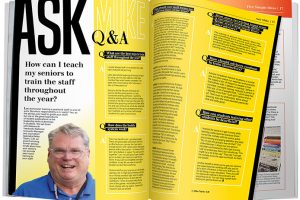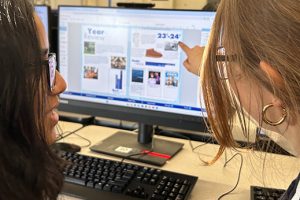Making Parents Part of the Program
You may be overlooking a vast and multi-talented resource for your yearbook program: parents. Parents love their children, want them to succeed and want to help when they can. If you show them the value of your program, and explain how it works in a way they can support it, your program will benefit.
“Involving the parents will maximize success of the program,” said Jeff Moffitt, yearbook adviser at Olympia High School in Orlando, Fla.
“If parents know what kids are getting involved with, and how much work is involved, and if they know me, then if there are problems later on, it helps,” he said.
To get parents involved in the program, they must understand what is expected of their children. For many parents, this is their first experience with an atypical class, said Celia McDuff, adviser at Wichita High School Northwest in Wichita, Kan.
“Grading, time requirements and expectations are different,” she said.
Advisers need to be up front with parents about requirements such as work nights, work loads, deadlines, and grades. For example, McDuff tells her staff’s parents that the last day of yearbook class for the year is when the yearbook is done, even if the seniors are out. Last year there were five sports playing after school was out, and those events needed to be covered and included in their summer delivery book, McDuff said. She flunked three students last year for not completing this requirement.
Also, parents need to understand that yearbooks are produced differently than when they were in school. Students work with desktop technology, and do not have these programs at home.
With so many things for parents to be aware of, many advisers have methods for getting their parents on board with the program, including Moffitt and McDuff. Here are some of the ways they get parent support.
We Get Letters
Like many advisers, Moffitt and McDuff write letters to parents to explain the program.
Moffitt has two letters, one in the staff application packet aspiring staff members pick up in February or March, and one at the start of school in the fall.
Staff application packets are available in the yearbook room, and Moffitt takes each student’s name and follows up if a packet is not returned. Moffitt said he has contacted a few parents who would not let their children be on staff. Parents know their children, he said.
“It’s good because it weeds them out,” Moffitt said of his application system.
The back-to-school letter comes with the syllabus, which explains his grading system (of which 10 percent is participation), the after-school lab students must attend one day a week, and equipment use and responsibility. Everything that the student signs – letters, the student contract/parent Statement of Understanding and the syllabus – a parent must sign as well, he said.
Wichita Northwest has a four-year yearbook program, so most of McDuff’s correspondence is aimed at freshmen and their parents. She also sends letters before deadlines so parents know the expectations, and parents must sign them.
“I don’t use them as much as I should, but it is a beginning.”
Calls and Emails
McDuff said Wichita Northwest has great parental support in all school programs, and her yearbook program has a good reputation. With that school environment, and the letters, meeting with parents at open house and conferences, and seeing parents in the community, she has an easier time working with parents. She said in 33 years of advising, she has had only one or two parents who did not understand her program.
After she gets to know the new parents, it is easy for her and parents to pick up the phone and call. The direct phone line into the classroom has made parents feel comfortable in calling, and cell phones have improved communication, she said.
She also will not hesitate to call parents. While a phone call to a parent can resolve a problem, McDuff said telling a student she will be happy to call a parent has solved problems without picking up the phone.
“Parents know I run a tight ship,” she said.
McDuff also invites parents into her classroom. When she does a one-on-one critique of a student, especially before the first deadline, she asks the parents to come and watch her go over a page on the computer with a student. When parents see this, it eliminates many questions from them. Usually parents do not have any idea what is involved in yearbook production, and it is a good learning experience for the student and parent.
“There are things I may say privately to the student (later), but I don’t whitewash anything for parents,” McDuff said.
This year, Moffitt has sent parent emails called Moffitt’s Minutes, and he is trying to be more consistent about it since he gets good feedback.
“It’s powerful for how easy it is. Ten minutes to write,” Moffitt said, regarding the way he communicates with parents of 27 students. “It’s awesome because the parents know we’re on deadline.”
Magical Food
Moffitt wanted to get parents more involved, so he started POPS, the Parents of Publications Students booster club. The group helps with transportation to field trips and conferences, donates food, plans the year-end party, supervises yearbook sales, helps with picture day, and runs errands.
“I don’t use them as much as I should, but it is a beginning,” he said.
McDuff said Wichita Northwest has an all-school booster club that supports all activities, not just sports. She has gone to them for financial support, but luckily the book is fairly self-supporting, she said.
Moffitt is sensitive to students who do not want their parents around. He has had students who do not want their parents helping sell books in the school. But there are ways parents can help in the background. For example, Moffitt will remind his students of deadlines and other events coming up, then in a day or so the office calls down to the room to say food has arrived for them.
“They like when brownies magically appear,” he said.
Parents of McDuff’s students send dinners and goodies around deadline time, too. Also, when the staff goes to convention, they will send a box of goodies to the hotel for the students.
“Parents who have been around longer are more sensitive to our needs and take a leadership role,” she said.
Moffitt said there is another benefit to having parental support.
“If the parents know you and like what you’re doing, the student will return for another year, and that’s important… because they become the trainers for the new kids.”
Tag:Advisers, Staff Management



